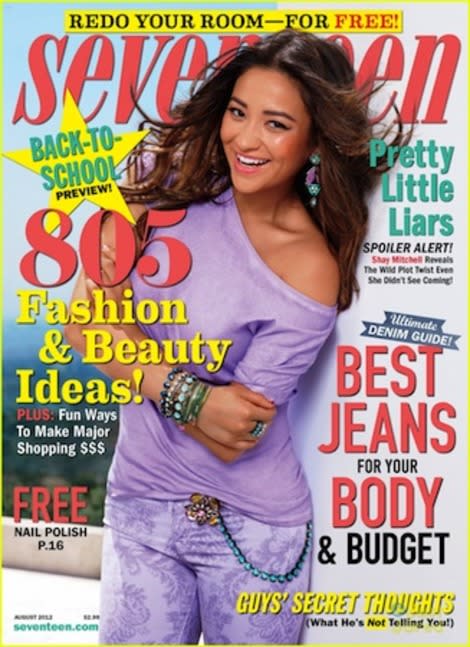Teenage Girl Wins Victory in Seventeen Photo-retouch Battle

Just a few months ago, Julia Bluhm, 14, was a regular ballet-obsessed eight grader living in Waterville, Maine. Now she's one of the leaders in a campaign to force fashion magazines to be more transparent about their use of photo retouching.
Related: Teen Girl Petitions Seventeen Magazine to Stop Airbrushing Models
On July 3, Seventeen magazine's editor in chief, Ann Shoket, announced that the publication had written up a Body Peace Treaty, signed by the whole staff, which pledged to "never change girls' body or face shapes" and use images of "real girls and models who are healthy." They will also reveal what goes on behind-the-scenes at photo shoots on their Tumblr.
VIDEO: Nine Astounding Photoshop Transformations
The magazine's move is a response to a viral petition created by Bluhm earlier this spring. Posted on April 19, her demand that Seventeen feature one completely un-retouched photo spread a month eventually garnered 84,000 signatures. It read:
"To girls today, the word 'pretty' means skinny and blemish-free. Why is that, when so few girls actually fit into such a narrow category? It's because the media tells us that 'pretty' girls are impossibly thin with perfect skin.
Here's what lots of girls don't know. Those 'pretty women' that we see in magazines are fake. They're often photo-shopped, airbrushed, edited to look thinner, and to appear like they have perfect skin. A girl you see in a magazine probably looks a lot different in real life….I've been fighting to stop magazines, toy companies, and other big businesses from creating products, photo spreads and ads that hurt girls and break our self-esteem….I've learned that we have the power to fight back."
Two weeks after Bluhm posted the petition, Shocket invited her to meet at Seventeen's offices. At that time, no firm commitment was made. In the ensuing months, the magazine was deluged by letters from young women. "While we work hard behind the scenes to make sure we're being authentic," wrote Shoket in her August editor's letter, "your notes made me realize that it was time for us to be more public about our commitment." Change.org, the organization that assisted Bluhm, says they will be monitoring the magazine's compliance over the next six months.
Related: Supermodel Moms
The American Medical Association and the National Eating Disorders Association, among other organizations, say that unrealistic images propagated by the media can trigger body image and self-esteem issues and contribute to eating disorders. Over the last year, the fashion industry has been under pressure to limit airbrushing and avoid using too-skinny models. In February, Glamour promised not put its models or featured celebs on a "digital diet" and the following month, Vogue said they would ban underweight models.
In response to her win, Bluhm wrote on her petition page, "Seventeen listened! They're saying they won't use photoshop to digitally alter their models! This is a huge victory, and I'm so unbelievably happy." Now, she is supporting a new effort by two other young activists, Carina Cruz and Emma Stydahar, to end photo retouching at another girls magazine. Look out, Teen Vogue.
Also on Shine:
